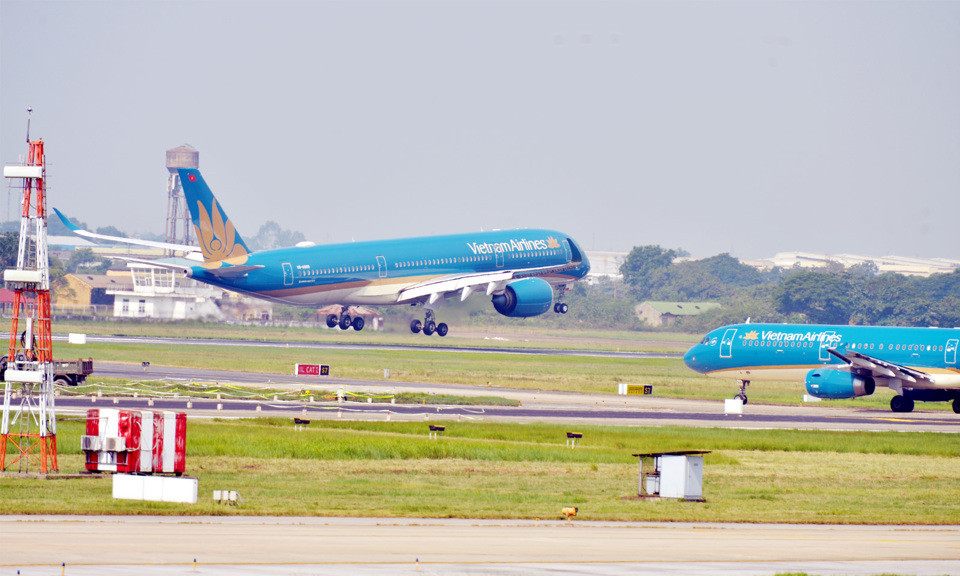The Committee for State Capital Management (CSCM) is tasked with proposing a comprehensive support plan for the flag carrier Vietnam Airlines in February, which has struggled to recover since the onset of the Covid-19 pandemic.
 |
| Vietnam Airlines has been struggling to recover since the onset of the Covid-19 pandemic. Photo: Pham Hung/The Hanoi Times |
The Government Office released Prime Minister Pham Minh Chinh's instruction after his meeting between the Government leader and leaders of CSCM and 19 major state-owned corporations on February 14.
During the pandemic period (2020-2022), the aviation sector, including Vietnam Airlines, was severely affected by market disruptions.
According to the 2022 consolidated financial report released at the end of last year, as of December 31, 2022, Vietnam Airlines' short-term liabilities exceeded short-term assets by VND39.47 trillion ($1.61 billion), with negative owner's equity of VND11.05 trillion ($451 million) and overdue liabilities of VND15.4 trillion ($629 million). In the fiscal year ending on the same date, the airline incurred a loss after tax of VND11.2 trillion ($457.3 million).
In 2023, Vietnam Airlines' business performance improved, but its consolidated profit after tax remained negative at around VND5.5 trillion ($224.5 million). Compared to 2022, this loss figure was halved, equivalent to over VND5.7 trillion ($232.6 million).
By the end of 2023, the national airline's equity capital was almost negative at VND17 trillion ($694 million). The airline's accumulated loss exceeded VND40 trillion ($1.63 billion).
According to forecasts, the international market will gradually recover, and the business activities of Vietnam Airlines are expected to yield more positive results in 2024-2025.
The airline has completed the Restructuring Plan for the 2022-2025 period and is currently reporting to shareholders and seeking approval from relevant authorities. Vietnam Airlines stated that it would restructure its assets and investment portfolio to increase revenue and cash flow and prepare the necessary conditions for issuing additional shares to increase owner's equity upon approval.
Meanwhile, the Ministry of Finance is amending the Decree on investment and state capital management in enterprises, proposing solutions for Vietnam Airlines to divest from Pacific Airlines Joint Stock Company.
This is also part of the comprehensive plan to overcome the difficulties of the national airline.
In the instruction, the Prime Minister estimated that 2024 still poses many challenges. Therefore, he requested 19 major state-owned enterprises with significant national resources to invest in efficient development, production, and business expansion. Additionally, financial targets, especially contributions to the national budget growth in 2024, must surpass those of 2023.
To achieve these goals, along with Vietnam Airlines, Chinh instructed the CSCM to submit a definitive plan to the Government leader in March on how to handle the Viet Trung Steel project and the expansion of the Dung Quat Steel Plant Phase 2; the restructuring plan of the Vietnam Expressway Corporation (VEC) and the Dung Quat Shipyard in the first quarter.
He tasked ministries to create favorable conditions and resolve legal issues related to taxes, land, real estate, and housing to enable these corporations to invest in development. The CSCM will study and work with ministries to find solutions for enterprises promptly. The ministries will coordinate in the spirit of national interests and avoid evasion, harassment, or obstruction, Chinh said.
The Vietnam Electricity Group, the Vietnam Oil and Gas Group, the Vietnam National Coal and Mineral Industries Group, and the Vietnam National Petroleum Group will ensure a significant balance for the economy in terms of electricity, oil, and gas in 2024, he requested.
Additionally, the Prime Minister instructed the Ministry of Industry and Trade to review the mechanism for managing intermediaries in the petroleum business towards reducing their number and adjusting electricity prices appropriately. This ministry was tasked with submitting a draft decree on the petroleum business within March and developing gas, wind, and solar electricity prices compatible with market mechanisms, to be submitted to the Government in the second quarter.
Source: Hanoitimes